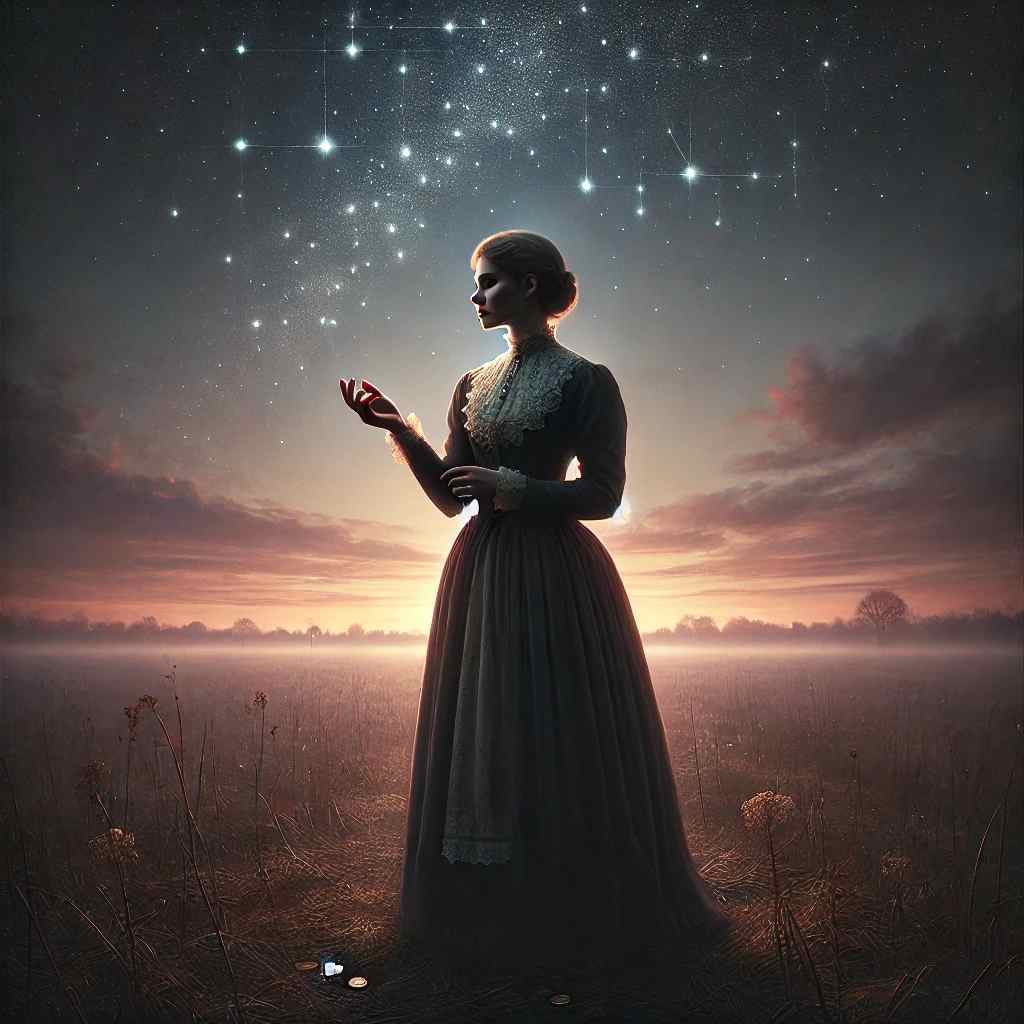Lost
Emily Dickinson
1830 to 1886

I lost a world the other day.
Has anybody found?
You'll know it by the row of stars
Around its forehead bound.
A rich man might not notice it;
Yet to my frugal eye
Of more esteem than ducats.
Oh, find it, sir, for me!
Emily Dickinson's Lost
Emily Dickinson’s poem "Lost" offers a brief yet poignant meditation on loss, value, and the nature of perception. With her characteristic simplicity, Dickinson compresses profound themes into just a few lines, exploring how loss can be deeply personal, even if the lost "world" may seem inconsequential to others.
Introduction to the Theme of Loss and Value
In this poem, Dickinson opens with a startlingly personal statement: "I lost a world the other day." This line captures the reader’s attention immediately, implying the magnitude of her loss. Rather than something trivial, what she has lost holds the gravity and vastness of a “world.” This suggests not only a personal sense of loss but also a shift in how she experiences her place within the universe.
The notion of loss in Dickinson’s work often transcends the literal, suggesting a philosophical or emotional dimension. Here, the lost "world" may represent a forgotten dream, an abandoned ideal, or an element of innocence or wonder that has slipped away. This thematic ambiguity invites readers to consider their own interpretations of what a "lost world" could mean, emphasizing how the essence of value and loss is intensely subjective.
Analysis of Imagery and Symbolism
Dickinson uses celestial imagery to help define this lost world, describing it with a “row of stars / Around its forehead bound.” Stars, often symbols of guidance, mystery, and the sublime, contribute a sense of otherworldly significance to this "world." The line suggests an almost regal or divine quality—something adorned and precious, set apart from ordinary, earthly concerns. This imagery is unusual, as Dickinson uses anthropomorphic features, such as a "forehead," to give this world a tangible and familiar quality, rendering it both intimate and exalted.
The stars may also symbolize a certain knowledge or enlightenment that has been lost. In Dickinson's time, as today, stars were symbols of hope, eternity, and sometimes fate. Thus, losing a world "bound" with stars could imply losing one's guiding light or a cherished understanding. The request "Has anybody found?" in this context feels both rhetorical and genuinely imploring, emphasizing the poem’s melancholic tone.
Exploring the Notion of Value
The third and fourth lines focus on contrasting value systems. A “rich man” might overlook the lost world due to his material wealth, which blinds him to values beyond monetary worth. In contrast, Dickinson’s “frugal eye” recognizes its profound importance, elevating it "Of more esteem than ducats." Here, “ducats” (gold coins) symbolize material wealth, reinforcing the poet’s reverence for what is intangible or irreplaceable by physical means. Dickinson subtly critiques the limitations of wealth, implying that material abundance cannot substitute for spiritual or emotional fulfillment. Her "frugal eye" appreciates things that are, paradoxically, invaluable—those that carry intrinsic worth unmeasured by worldly standards.
The personal nature of her loss is underscored by this subjective valuation. This “world” that she has lost is precious only to her. By using the adjective “frugal,” Dickinson contrasts herself with the "rich man," showing that it is precisely her ability to appreciate simplicity that enables her to grasp the worth of the lost world.
Appeal and the Plea for Recognition
The final line, "Oh, find it, sir, for me!" introduces a slight shift in tone, as Dickinson appeals to an unnamed “sir” for assistance. This could be a plea to the reader, to God, or to an imagined figure who might have the power to restore her loss. The use of “sir” is significant, formalizing the plea and adding an element of decorum, which may hint at her sense of helplessness. She calls out, acknowledging the limits of her own ability to reclaim what has been lost. This line amplifies the poem’s emotional resonance, blending resignation with an almost childlike hope that someone, somehow, might help her regain this cherished possession.
Conclusion
Emily Dickinson’s "Lost" is a meditation on personal loss that challenges conventional understandings of value and material wealth. By evoking the idea of a lost "world" adorned with stars, Dickinson invites readers to consider the inner landscapes we each hold dear—spaces and ideals that, once lost, cannot be easily recovered. Her critique of material wealth against the backdrop of frugality suggests that the most valuable things in life are those which cannot be bought or sold. The poem closes with a note of longing, underscoring the futility yet enduring hope in the face of profound, intangible loss.
In sum, Dickinson masterfully uses imagery and brevity to convey the paradox of loss: the vastness of an absence that is visible only to those who understand its worth.
This text was generated by AI and is for reference only. Learn more
Want to join the discussion? Reopen or create a unique username to comment. No personal details required!



Comments
No comments yet. Be the first to comment!